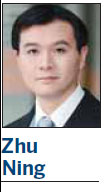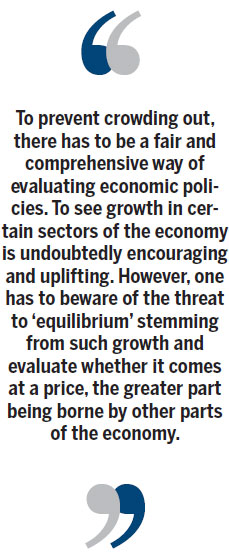Beware big success crowding out smaller players
Updated: 2013-08-09 09:22
By Zhu Ning (China Daily)
|
|||||||||||

China faces dilemma of state firms doing well at expense of private sector and balanced economy
A record number of companies from the Chinese mainland have been ranked in the prestigious Fortune 500 list of global companies, narrowing the gap with the US, the long time leader in this category.
However, there are concerns that many of China's ranked companies are not only large state-owned enterprises and mostly from monopolistic and resource-driven sectors, but that due to the recent credit crunch and difficulty in obtaining bank loans, these enterprises are "crowding out" small and medium-sized enterprises.
The crowding-out effect is a term economists use in evaluating government-led investment and expenditure projects. They point out that, although government investment and expenditure can create new demand to bolster the economy in the short term, it runs the risk of replacing original demand provided by the market and SMEs.
Because of government influence, the private sector may find it harder to compete or operate in the market and decide to quit.
To prevent crowding out, there has to be a fair and comprehensive way of evaluating economic policies. To see growth in certain sectors of the economy is undoubtedly encouraging and uplifting. However, one has to beware of the threat to "equilibrium" stemming from such growth and evaluate whether it comes at a price, the greater part being borne by other parts of the economy.
Focusing on piecemeal benefits and failing to integrate social welfare gains or losses may jeopardize the sustainability of every sector of the economy.
The fast development of large enterprises, especially SOEs, is encouraging and laudable. But at the same time, one has to realize with the SOEs having greater influence in the economy, they are causing centralization in a growing number of industries.
Even more concerning, many large enterprises leverage their advantages in regulated sectors and encroach on other once-competitive industries. With their advantages in resources, personnel, and access to the capital markets, such large SOEs gradually crowd out the SMEs originally flourishing in the market.

To make matters worse, because of their operational stability, large companies are much more favored by banks when it comes to loans, even at low interest rates. The expansion of large enterprises thus makes it harder for SMEs to get funds. This is one way in which the development of large enterprises can have a profound yet indirect adverse impact on SMEs.
The crowding-out effect also largely depends on whether the economy is operating at close to capacity level. If not, then the government's investment and expenditure may prove effective in creating additional demand and stimulating the economy.
However, if the economy is already operating at a near-capacity level, as is the case in many Chinese industrial sectors, then the government's stimulus may not be as effective as hoped.
Instead, government investment and expenditure may crowd out the products and services originally provided by the private sector, without being able to create the additional demand needed to further stimulate the economy. The net outcome of such government actions could be a transfer of business from the private to the public sector, which is often associated with undesirable outcomes such as increased prices, less competition and poorer service.
Such consequences are particularly unwelcome in China at present, as international experience shows that SMEs are very important to sustain a country's economic growth, high employment, innovation in technology and business models, and urbanization - key goals for China in its critical transition and economic growth model, in its further reform toward a market economy and open financial system, and in its attempt to accomplish a new phase of urbanization.
Therefore, while we applaud the fact that more Chinese companies are being ranked in the enviable Fortune 500 list, let us not forget that a certain price has to be paid to gain such rankings. Let us not forget the "equilibrium" essence of economic thinking and prudently strike a balance between large SOEs and SMEs.
A healthy balance between the two may hold the key to the sustainable growth of both sectors, and the entire economy.
The author is faculty fellow at the International Center for Finance, Yale University, and deputy director of the Shanghai Advanced Institute of Finance, Shanghai Jiao Tong University. The views do not necessarily reflect those of China Daily.
(China Daily European Weekly 08/09/2013 page11)
Today's Top News
List of approved GM food clarified
ID checks for express deliveries in Guangdong
Govt to expand elderly care
University asks freshmen to sign suicide disclaimer
Tibet gears up for new climbing season
Media asked to promote Sino-Indian ties
Shots fired at Washington Navy Yard
Minimum growth rate set at 7%
Hot Topics
Lunar probe , China growth forecasts, Emission rules get tougher, China seen through 'colored lens', International board,
Editor's Picks

|

|

|

|

|

|





